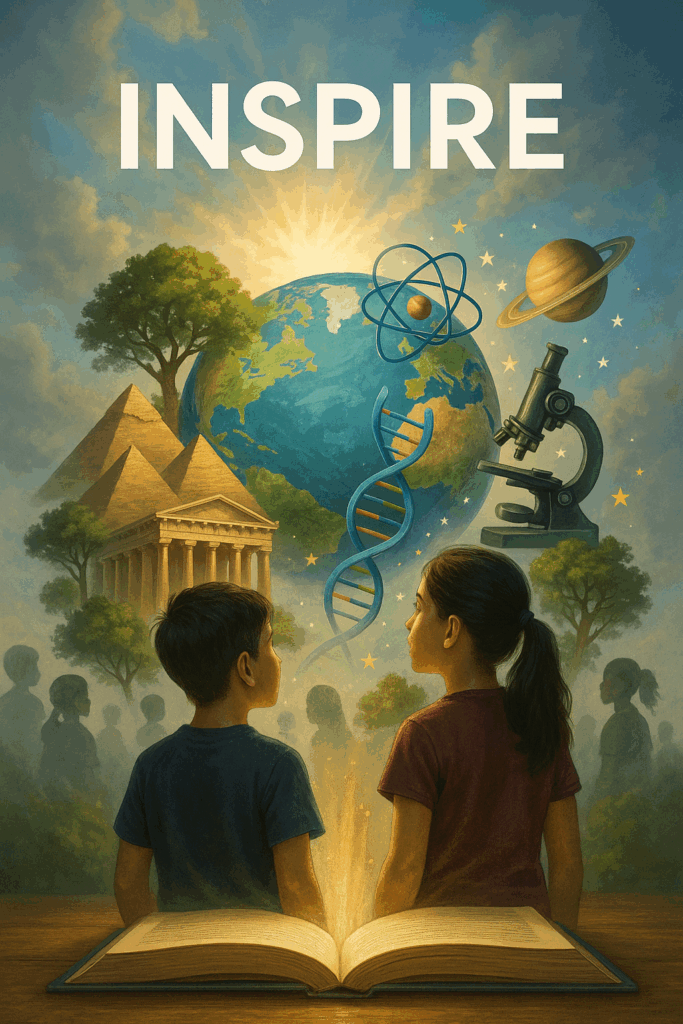Inspire
A Critical Thinking Program Exploring Science, Literature, Self & Society (Grades 7-8)
Inspire is a dynamic enrichment course for students in Grades 7 and 8 that blends scientific inquiry, literary exploration, and personal reflection to examine the world and our place in it. Students engage deeply with topics in science and technology, analyze powerful works of literature, and explore the connections between personal identity and broader social change.
Through hands-on and minds-on projects, learners tackle questions about innovation, ethics, belief systems, and human progress. Whether investigating the mysteries of space, debating the impact of artificial intelligence, or interpreting poetry that speaks to social justice, students sharpen their critical thinking and communication skills in real-world contexts.
Inspire moves beyond the standard curriculum to develop well-rounded, thoughtful students prepared to thrive in school—and to lead with insight, empathy, and purpose in the world beyond it.

Theme 1: Foundations in Social Studies
- Community and Identity: Study individual and collective identities, belonging, and active citizenship.
- Influential Historical Figures: Examine the lives and impacts of figures such as Mahatma Gandhi, Martin Luther King Jr., and Viola Desmond.
- Contemporary Issues: Analyze pressing issues, including climate change, Indigenous rights, and civic duties in local and global contexts.
- Digital Citizenship Basics: Learn about responsible social media use, online privacy, cyberbullying prevention, and digital footprints.
- Media Literacy Fundamentals: Explore key concepts, including bias, propaganda, target audiences, and the impact of media representation.
Theme 2: Introduction to Language Arts
- Literary Forms and Genres: Engage with short stories by Ray Bradbury, poetry by Maya Angelou, myths from diverse cultures, and informational texts on social issues.
- Creative Expression: Develop writing skills in poetry, short stories, and personal narratives, with an emphasis on using descriptive language and crafting a compelling narrative voice.
- Literary Devices: Study imagery, metaphor, simile, personification, alliteration, and hyperbole in various literary texts.
- Elements of Storytelling: Explore narrative structure, character development, and thematic conflict through classic and contemporary literature.
- Introduction to Essay Writing: Practice writing persuasive and expository essays with clear thesis statements, logical arguments, and supporting evidence.
Theme 3: Critical Thinking and Personal Development
- Logical and Analytical Thinking: Conduct exercises in logical puzzles, riddles, and scenario-based problem-solving.
- Introduction to Ethics: Discuss scenarios related to fairness, academic honesty, social justice, and personal integrity.
- Emotional Intelligence: Activities for self-reflection, identifying and managing emotions, empathy exercises, and stress management techniques.
- Social Skills Development: Develop teamwork and leadership skills through collaborative projects, effective communication practices, and conflict resolution workshops.
- Cultural Awareness: Analyze cultural diversity, exploring customs, traditions, holidays, and etiquette from various cultures worldwide.
Theme 4: Fundamentals of Science and Technology
- Understanding Technology: Examine technological innovations, including smartphones, robotics, and renewable energy.
- Tech Ethics: Discuss ethical issues around digital privacy, data use, artificial intelligence, and responsible technology use.
- Scientific Exploration: Investigate the scientific method through hands-on experiments on ecosystems, energy transformations, and material properties.
- Introductory Design and Innovation: Participate in basic design projects, such as creating sustainable products or simple engineering challenges.
- Communicating Scientific Ideas: Practice clear scientific writing, presentations, and visual communication tools like diagrams and infographics.
Theme 5: Exploring Beliefs and Perceptions
- Introduction to Paradigms: Understand worldview concepts and how beliefs shape perceptions of reality.
- Healthy Skepticism: Evaluate popular myths, misinformation campaigns, and conspiracy theories to foster critical questioning.
- Evaluating Information Sources: Develop techniques for distinguishing credible sources from unreliable information.
- Belief Formation: Explore influences of family, peers, media, and culture on personal beliefs.
- Understanding Change: Study events such as the Industrial Revolution, the Civil Rights Movement, and technological advances, and their effects on society.
Theme 6: Introduction to Earth Science and Astronomy
- Basic Earth Science Principles: Explore geology, weather patterns, climate change, ecosystems, and environmental conservation.
- Astronomy Essentials: Investigate celestial bodies, solar system dynamics, moon phases, and recent astronomical discoveries.
- Scientific Mysteries: Discuss unresolved scientific phenomena like dark matter, black holes, and the potential for life elsewhere in the universe.
- History and Future of Space Exploration: Study key space missions, such as the Apollo and Mars rovers, and emerging technologies, such as space tourism and colonization efforts.
- Reflections on Our Universe: Philosophical discussions about existence, the vastness of space, and humanity’s curiosity about the cosmos.